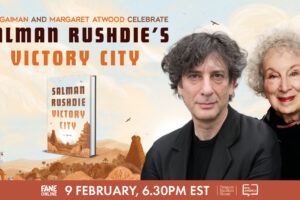A Celebration of Salman Rushdie and His New Novel Victory City for Readers on Both Sides of the Atlantic

By Suzanne Trimel
(NEW YORK)—PEN America, PEN Canada and English PEN hosted two global literary stars, Canadian Margaret Atwood and British-born Neil Gaiman, on Thursday evening for an online conversation airing in the three countries and celebrating Indian-British-American author Salman Rushdie, and the triumphant release of his 16th novel, Victory City.
The event featured readings of the novel by the British actress Sarita Choudhury, who is of Indian descent and has starred in American and global films and popular American television series such as Homeland and And Just Like That. Writer-critic Erica Wagner presided as interlocutor.
Wagner opened the event with a tribute to Rushdie’s longtime defense of free speech and free expression, the cause he devoted himself to as president of PEN America from 2004-2006. Rushdie has said famously: “Free speech is the whole thing, the whole ball game. Free speech is life itself.”
I’ll be watching! https://t.co/2EzOtG8qhw
— Salman Rushdie (@SalmanRushdie) February 4, 2023
The conversation between Atwood and Gaiman roamed the landscape of literary themes in the novel—mythology, armed conflict, dynastic hierarchies, feminism and the magic and enduring value of storytelling itself. Along the path, the two offered praise for Rushdie’s literary genius, as a humorist, artist and spinner of great yarns.
Gaiman described the novel as a magical tale but one drawn from a real Indian empire that flourished during the Medieval era. The book is a fictional retelling of the fallen Indian empire of Vijayanagar. Gaiman said: ““This is a story about the rise and fall of a very small empire. There is enormous joy in watching dynastic stories play out.” He said: “Salman is a deep author who does his homework. There is a specific time, a specific place. The lovely thing about good literature is that it should be something a reader can read with pleasure and then again for more depth.”
Atwood and Gaiman connected the dots for a global audience immersed in pop culture. Atwood compared the novel’s plot lines to the power plays in the wildly popular TV series Game of Thrones. “He’s drawing on real stuff that goes on when there are aristocracies and hierarchies,” she said of Rushdie. “This is what people do, not always attractively.”
As to their own enjoyment of the book, simply as readers, they both were enchanted.
Gaiman said: “I love feeling that you’re in the hands of a master. You’re in the hands of somebody who’s just so assured, and you’re being told something that you know is not true. It’s comfortable. It’s refreshing, and you sit down like a small kid, ready to be told your story.”
Atwood referred to the “allure” of the book and said from the opening paragraphs “we realize this is going to be a fabulous tale…. And it’s a great opening because it sucks us right in, and that’s what you want in an opening. You want to know what happens next? How is this going to play out?”
Victory City tells the story of Pampa Kampana, a sorceress and poet who dreams a civilization into existence from magic seeds. Through divine intervention, Pampa lives for more than two centuries, witnessing victories and defeats, chronicling the story and sealing it in a clay pot for future generations.
The Indian novelist Kiran Desai has called the book a love letter to readers and writers. “It’s a distillation of wisdom. A belief that beautiful words and stories will remain in our memories and whisper through the dream of subsequent generations.” she said.
The online event was a stand-in for the author events that certainly would have crowded Rushdie’s schedule with the release of his novel, if not for his continued recovery from severe injuries he suffered last Aug. 12, when he took the stage in upstate New York and was stabbed repeatedly by an admirer of the Iranian theocrat who issued a death threat against Rushdie more than 30 years ago.
The author – who spent more than a decade in hiding due to the death threat over his book The Satanic Verses – was hospitalized for six weeks, and he lost vision in one eye as well as the use of one hand.
In his only interview since the attack, he told The New Yorker in an article published Feb. 6: “I’ve tried very hard over these years to avoid recrimination and bitterness. I just think it’s not a good look. One of the ways I’ve dealt with this whole thing is to look forward and not backwards. What happens tomorrow is more important than what happened yesterday.”
In response to a question posed by Wagner about the power and the danger of storytelling, Gaiman said: “Stories motivate us, stories send us to war. We live and die for stories. We build our lives on stories. Salman’s attacker was motivated by a story. Stories are as dangerous as they are liberating.”
A recording of the conversation will be available to watch on PEN.org through Feb. 23.






